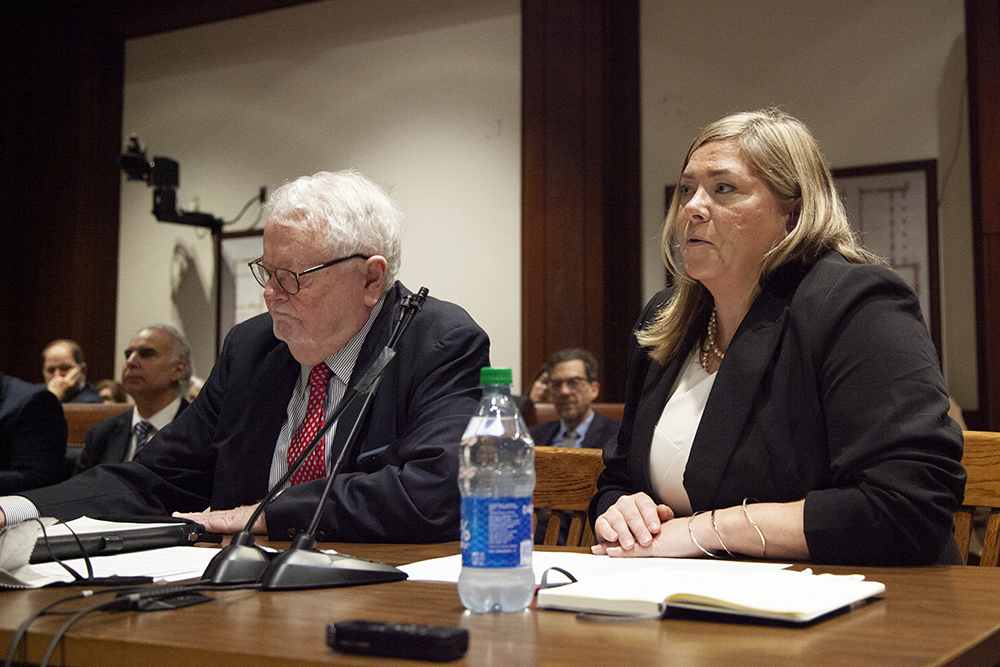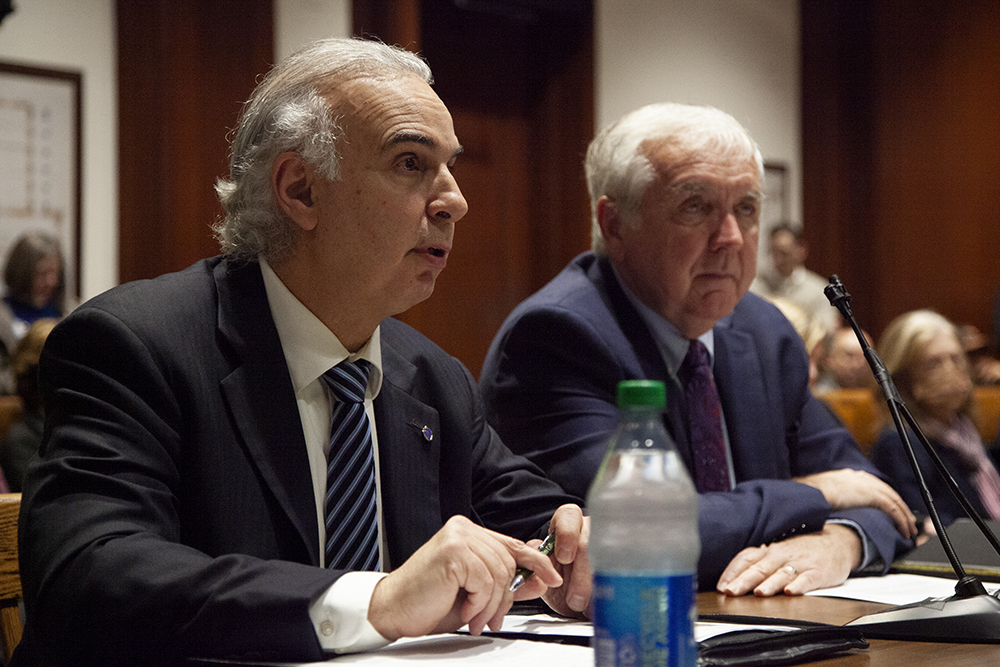Chris Lisinski, State House News Service.
Both Republican candidates who want Massachusetts lawmakers to reverse or nullify their narrow election losses said Friday that they attribute the alleged problems to “human error,” not to fraud or more politically charged motivation.
A three-member House panel set out Friday to examine the results in the Second Essex District, where Democrat Kristin Kassner topped Republican Rep. Lenny Mirra by one vote, and the First Middlesex District, where Democrat Margaret Scarsdale beat Republican challenger Andrew Shepherd by seven votes.
In the first events of their kind in more than a decade, the special committee invited candidates in both races and their lawyers to the State House for a pair of hearings where the Republicans aired their grievances over the recounts that ended with miniscule margins and the Democrats defended the certified results as valid.
“I don’t want anyone to think this was a quote-unquote stolen election. Those are inflammatory words, especially these days,” Mirra, a five-term incumbent from Georgetown, said during the hearing. “I don’t think there was any kind of massive fraud involved, there was no conspiracy involved, there was no nefarious intent here. When you find 14 extra ballots in the town, honestly, Mr. Chairman, I think it’s a simple matter of human error.”
“I think it was held fairly. I think every town clerk did their best to hold a fair and open election, and I think any of the issues that we brought up today honestly are simply a matter of human error,” he added.
Shepherd, a first-time Republican candidate from Townsend, delivered nearly the exact same message to lawmakers a few hours later.
Both Kassner of Hamilton and Scarsdale of Pepperell, who had their victories certified by the Governor’s Council on Dec. 14, remain in limbo more than a week into the 2023-2024 session after House leaders moved to delay their inauguration and task the special committee with deciding the final outcome in the contested races.
Mirra filed a lawsuit on Dec. 21 alleging that enough ballots should have been tossed or counted differently to change the outcome in his race. His legal challenges have been unsuccessful in every level of court from Superior Court up to the Supreme Judicial Court, with judges writing that they believe jurisdiction lies with the House itself and not the judicial branch.
Shepherd similarly filed a lawsuit on Dec. 23, and a judge in his case has not yet ruled.
It’s not clear how long the review by the committee, which consists of Stoneham Democrat Rep. Michael Day, Charlestown Democrat Rep. Daniel Ryan and House Minority Leader Brad Jones of North Reading, will take. Day, who chairs the special committee, said in between the two hearings Friday that the trio is “committed to resolving this as expeditiously as possible, which is why we called this hearing this quickly,” but he did not outline a specific timeframe.
Day declined to detail the next steps the panel will take. Asked if lawmakers would review each challenged ballot before deciding the outcome, he replied, “It’s all under advisement. We’re going to discuss this as a special committee.”
However, Jones said during the first hearing of the day that “we, ultimately as the final judge of this, may need to look at those contested issues” as lawmakers weigh next steps.
The top House Republican also indicated multiple times over the course of Friday’s hearings that he believes sweeping elections reforms in recent years, including permanent authorization of widespread mail-in voting, may have played a role in the upheaval behind the pair of challenged recounts.
At one point, Jones suggested the “Legislature in some instances set up clerks for failure.”
Mirra is hoping lawmakers will either name him the winner, reversing his one-vote loss, or call for a new election. He and his attorney, former U.S. Attorney Michael Sullivan, spoke with the panel for about 45 minutes to detail allegations that some ballots rejected in the recount should have been counted for Mirra, that clerks failed to compare mail-in ballot signatures as required by law and that there was no explanation provided for 14 additional ballots discovered in Ipswich during the recount.
After speaking with lawmakers, Mirra told reporters he believes 28 ballots were formally contested by either candidate for various reasons, including use of pencil or colored ink to fill them out.
“After a yearlong campaign, a close election, a complicated recount, and some court proceedings, I’m ready to take on this new challenge,” Kassner said. “I’ve continued to meet with constituents preparing for the legislation deadline (on Jan. 20) to address really important issues that are facing both the commonwealth as well as our communities.”
Sullivan urged the committee to “look at all of the ballots,” detailing one the Mirra camp had highlighted in its original unsuccessful Superior Court lawsuit. According to Sullivan, who said he did not witness the ballot’s examination personally, the voter in that instance wrote in the name “Donald Trump” in multiple places, but only filled in the bubble next to Mirra’s name and not next to the write-in space for state representative.
Local elections officials ruled that the ballot, which had originally been counted for Mirra, included an overvote and therefore was converted to a blank that did not add to either candidate’s tally.
Sullivan argued case law indicates a voter can write in multiple names and still have their vote counted for a candidate so long as the candidate oval is the only one they fill. “You could write in four names as write-ins, but I could still vote for you, Mr. Chair, as representative and my vote for you is the vote that should count, not the fact that I wrote in four names under you,” Sullivan said.
Kassner’s attorney, Gerald McDonough, made virtually the opposite case to lawmakers. “I saw the ballot in Ipswich. There was an oval filled in for Mr. Mirra, and then Donald Trump’s name was written in, and an oval was filled in for Donald Trump,” McDonough said. “Two ovals are filled in in that ballot. There’s no mistake about it in my mind.”
Asked by Jones if Kassner’s camp would object to lawmakers examining that ballot, McDonough said he does not believe a “piecemeal” probe is the way to go, then added that looking at the ballot would be “a waste of time.”
“To be honest with you, I think it’s a slap in the face to those registrars,” McDonough said. “They didn’t do this cavalierly. They didn’t go in there saying, ‘We’re going to do this for Mirra, we’re going to do this for Kassner.’ They spent an awful lot of time discussing it.”
Mirra’s team also questioned the validity of five “spoiled ballots” in Rowley that did not get counted in the original results but went to Kassner during the recount.
“Spoiled ballots are typically not unspoiled. A ballot gets spoiled for a number of reasons, including a voter determining that they had made a mistake and wished to have another ballot, and the initial ballot is marked spoiled,” Sullivan said. “The same could be true with regards to a mail-in ballot, where a voter subsequently decides that they want to vote either in person or to correct an earlier mail-in ballot.”
McDonough argued that in cases like voting for too many candidates in a given contest, only the section of the ballot dealing with that contest should be nullified, not the ballot as a whole. All five previously spoiled Rowley ballots that went to Kassner in the recount had been spoiled for issues in races other than state representative, according to McDonough.
One of the issues that Mirra raised appeared to catch the eye of Jones, the leader of the House’s Republican caucus.
Mirra’s attorney said the recount discovered 14 more ballots in Ipswich “that weren’t identified during the initial election” and that no explanation has been offered for the change.
“If you look at the vote totals from prior to the recount to after the recount, there’s 14 ballots [added] in Ipswich overall and almost de minimis throughout the rest of the district. So that raises a big question,” Jones said.
While the committee weighs next steps, Mirra remains in office as the state representative for the redrawn Second Essex District on a holdover basis. He told reporters he believes he still has all of the authorities and responsibilities that come with that job and has already filed about a dozen bills and requested committee assignments.

Democrat Kristin Kassner of Hamilton, right, appears at a special House committee hearing Friday alongside her attorney, Gerald McDonough, to defend Kassner’s one-vote victory as valid. (Chris Lisinski/SHNS.)

